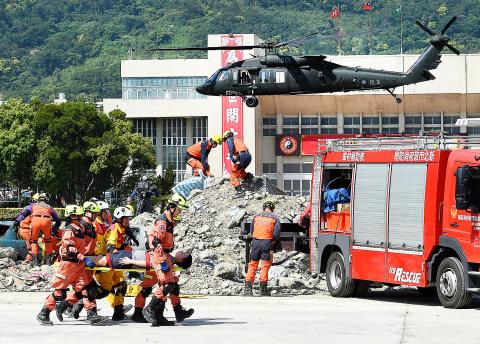The Central Weather Bureau yesterday announced that it would release some of its earthquake research data before the end of July, but people are banned from using the information to try to predict earthquakes.
It issued the statement in response to a proposal submitted to the National Development Council’s online public policy platform that the bureau disclose all data considered relevant to predicting earthquakes, including data on changes to terrestrial magnetism, geoelectricity, the ionosphere and groundwater levels.
The bureau said it would explain when and how the information should be used, when it is released in July, and that the data would be updated regularly.

Photo: Chu Pei-hsiung, Taipei Times
“The data is open to anyone who wants to use the information to conduct earthquake research. However, it should be noted that the technology used to predict earthquakes has yet to mature,” the bureau said. “The government also bans groups, schools and individuals from predicting earthquakes. Users of the data provided by the bureau should be mindful of relevant regulations stipulated in the Meteorological Act (氣象法) to avoid contravening the law.”
“The goal is to integrate various research methods to assess the possibility and magnitude of earthquakes in certain locations, at specific times. Interpretation of the so-called earthquake signs needs to be proven through more scientific experiments. They cannot be used to predict earthquakes at the moment,” it said.
Article 17 of the Meteorological Act states that the nation’s meteorological, seismological and marine meteorological forecasts and warnings shall be issued by the weather bureau.
However, military meteorological organizations and the Civil Aeronautics Administration’s meteorological affiliate, for the exclusive needs of the military or aviation safety, are not governed by this article.
Article 18 also states that, with the approval of the bureau, a government agency, institution or individual can issue weather or marine weather forecasts, but cannot issue any warnings or weather forecasts for torrential rain, typhoon or hazardous weather.

The Taoyuan Flight Attendants’ Union yesterday vowed to protest at the EVA Air Marathon on Sunday next week should EVA Airway Corp’s management continue to ignore the union’s petition to change rules on employees’ leave of absence system, after a flight attendant reportedly died after working on a long-haul flight while ill. The case has generated public discussion over whether taking personal or sick leave should affect a worker’s performance review. Several union members yesterday protested at the Legislative Yuan, holding white flowers and placards, while shouting: “Life is priceless; requesting leave is not a crime.” “The union is scheduled to meet with

‘UNITED FRONT’ RHETORIC: China’s TAO also plans to hold weekly, instead of biweekly, news conferences because it wants to control the cross-strait discourse, an expert said China’s plan to expand its single-entry visa-on-arrival service to Taiwanese would be of limited interest to Taiwanese and is a feeble attempt by Chinese administrators to demonstrate that they are doing something, the Mainland Affairs Council said yesterday. China’s Taiwan Affairs Office (TAO) spokesman Chen Binhua (陳斌華) said the program aims to facilitate travel to China for Taiwanese compatriots, regardless of whether they are arriving via direct flights or are entering mainland China through Hong Kong, Macau or other countries, and they would be able to apply for a single-entry visa-on-arrival at all eligible entry points in China. The policy aims

Taipei, New Taipei City, Keelung and Taoyuan would issue a decision at 8pm on whether to cancel work and school tomorrow due to forecasted heavy rain, Keelung Mayor Hsieh Kuo-liang (謝國樑) said today. Hsieh told reporters that absent some pressing reason, the four northern cities would announce the decision jointly at 8pm. Keelung is expected to receive between 300mm and 490mm of rain in the period from 2pm today through 2pm tomorrow, Central Weather Administration data showed. Keelung City Government regulations stipulate that school and work can be canceled if rain totals in mountainous or low-elevation areas are forecast to exceed 350mm in

EVA Airways president Sun Chia-ming (孫嘉明) and other senior executives yesterday bowed in apology over the death of a flight attendant, saying the company has begun improving its health-reporting, review and work coordination mechanisms. “We promise to handle this matter with the utmost responsibility to ensure safer and healthier working conditions for all EVA Air employees,” Sun said. The flight attendant, a woman surnamed Sun (孫), died on Friday last week of undisclosed causes shortly after returning from a work assignment in Milan, Italy, the airline said. Chinese-language media reported that the woman fell ill working on a Taipei-to-Milan flight on Sept. 22